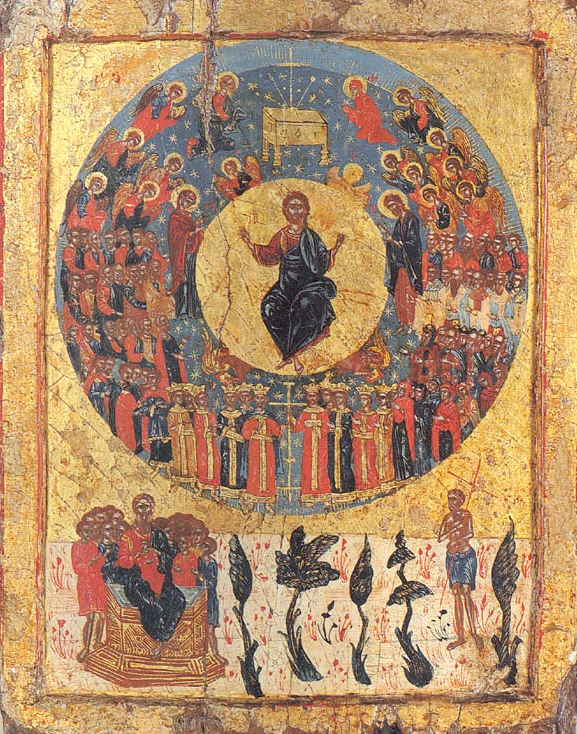Christian Art | Prayer And Vigilance
Luke 21: 34-36 – Week 34 Ordinary Time, Saturday; Sunday Advent 1 (Audio Bible KJV, Spoken Word)
34 ¶ And take heed to yourselves, lest at any time your hearts be overcharged with surfeiting, and drunkenness, and cares of this life, and so that day come upon you unawares.
35 For as a snare shall it come on all them that dwell on the face of the whole earth.
36 Watch ye therefore, and pray always, that ye may be accounted worthy to escape all these things that shall come to pass, and to stand before the Son of man.
Most of the signs Christ describes to his listeners in the eschatological discourse had already been realized by the time Luke’s first audience would have heard his Gospel. There had been, and were, wars, persecutions, family conflict, and Jerusalem with the Temple had been destroyed. The Christians of Luke’s time listening to these Gospel verses, of today and since Tuesday, could then have been encouraged to know that they were very close to Christ’s full revelation, his apocalypse, and so have courage to bear persecutions and other great challenges of the early Church.
Jesus presents his second coming, his parousia, in terms of sudden, unexpected universal upheaval, which his listeners may expect to overtake their lives, as a figure of judgement. We are effectively asked: if we were called to give an account of ourselves right now before God, how would we fare? Are we living right now in accordance with all that Jesus taught us? Do our lives proclaim our love of Christ?
Jesus tells us to be vigilant, not to let ourselves become spiritually occluded, weighed down by all that seems designed to distract and attach and addict us in this world, the gross trash that numbs our sensitivities and chokes our ability to think and feel freely.
Jesus tells us to watch, to remain spiritually awake and alert, and to nourish our spiritual life through prayer. Prayer becomes the source of a critical conscience and of hope. Through prayer, we deepen in our hearts the knowledge, the awareness of God’s presence among us, gaining the strength to escape the world’s snares and to remain true to Jesus and all that is genuinely for our well-being. When we are in a state of grace, the everyday demons, sold to us each day, just can’t sucker us.
We pray that, when we meet Christ at the end, we will not be afraid of judgement. We look forward in hope, faith and confidence to that visit of our Lord, when he embraces us and leads us into the house of his father to remain there forever.
Concluding Prayer
Come to me, Lord, with your help
that I may see the joy of your chosen ones
and may rejoice in the gladness of your nation
and share the glory of your people.
Through Christ our Lord.
![]()

Audio Bible KJV | Endnotes
Constant Prayer And Vigilance
The Gospel passage is a call to constant prayer and vigilance, reminding us that we must always be prepared for the coming of the Lord. The Gospel warns us against being consumed by the cares of this life and becoming distracted from our ultimate goal, which is to stand before the Son of Man.
In order to understand the importance of prayer and vigilance, we should examine the context in which these verses were written. The entire chapter of Luke 21 is dedicated to Jesus’ discussion of the end times, specifically the signs that will precede Jesus’ second coming – the parousia. Jesus warns his disciples that the day will come when the world as they know it will be destroyed, and Jesus urges his disciples to be prepared for this eventuality.
The Gospel highlights two specific dangers that we must guard against: surfeiting and drunkenness, and the cares of this life. Surfeiting and drunkenness refer to excess, whether it be in food or drink, or any other pleasure of the flesh. Jesus warns us against becoming so consumed by our physical desires that we lose sight of spiritual priorities.
The cares of this life are a different danger altogether. These refer to anxieties and concerns that we all face as we go about our daily lives. We must be careful not to become so preoccupied with these worries that we forget about the eternal perspective that should be guiding our actions.
Jesus warns that the day of his coming will come ‘as a snare’ upon all those who are unprepared. This is a warning that Christians must take seriously, for it implies that those who are not vigilant may be caught off guard and suffer the consequences.
Throughout the Bible, we are reminded of the importance of constant prayer and vigilance. In Matthew 24:42, Jesus tells us to ‘watch therefore: for ye know not what hour your Lord doth come’. Similarly, in 1 Peter 5:8, we are told to ‘be sober, be vigilant; because your adversary the devil, as a roaring lion, walketh about, seeking whom he may devour’.
The Church has emphasized the importance of prayer and vigilance. Saint Augustine wrote: ‘Pray as though everything depended on God. Work as though everything depended on you.’ Saint Teresa of Avila urged her followers to ‘pray as though everything depended on prayer’. These teachings remind Christians that while we must work diligently to prepare for the coming of the Lord, we must never forget that our ultimate success depends on the grace of God.
Protestant tradition has also emphasized the importance of constant prayer and vigilance. Martin Luther wrote: ‘To be a Christian without prayer is no more possible than to be alive without breathing.’ John Wesley similarly emphasized the importance of prayer in his teachings, calling it ‘the grand means of drawing near to God’.
Christian Prayer And Meditation
One way to maintain constant prayer and vigilance is to cultivate a habit of prayer and meditation. This involves setting aside time each day for prayer and reflection, and using that time to connect with God and to discern his will for our lives. By making prayer a regular part of our daily routine, we are better equipped to stay focused on our spiritual priorities and to guard against the distractions of this world.
Another way to cultivate constant prayer and vigilance is to be part of a supportive community of believers. This can be a church, a small group, or simply a group of like-minded individuals who share our commitment to Christian prayer and spiritual growth. By surrounding ourselves with people who share our values and our goals, we are more likely to stay on track and to remain vigilant in the face of the many distractions and temptations that surround us.
Prayer and vigilance require a deep commitment to our faith and a willingness to put God first in all aspects of our lives. This means living a life of integrity, seeking to serve others, and striving to grow in our understanding and love of God each day. As we do this, we will be better equipped to navigate the challenges of this world and to stand firm in our Christian faith, even in the face of adversity and persecution.








